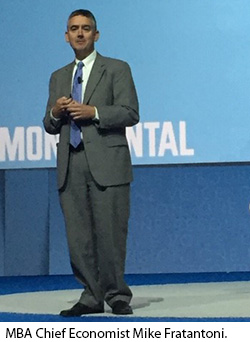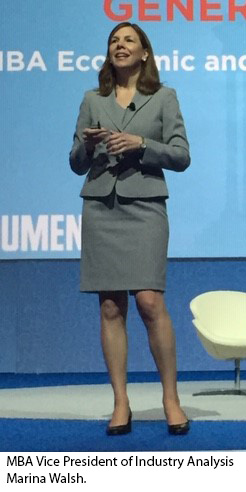
MBA Forecast: 2019 Purchase Originations to Increase to $1.2 Trillion as Refis Decline
 WASHINGTON, D.C.–The Mortgage Bankers Association forecasts $1.2 trillion in purchase mortgage originations in 2019, a 4.2 percent increase from 2018, with refinance originations continuing to trend lower next year, decreasing by 12.4 percent to $395 billion.
WASHINGTON, D.C.–The Mortgage Bankers Association forecasts $1.2 trillion in purchase mortgage originations in 2019, a 4.2 percent increase from 2018, with refinance originations continuing to trend lower next year, decreasing by 12.4 percent to $395 billion.
MBA projected total mortgage originations to decrease to $1.63 trillion from $1.64 trillion this year. In 2020, MBA forecasts purchase originations of $1.27 trillion and refinance originations of $410 billion, totaling $1.68 trillion.
“The unemployment rate is at its lowest level in almost 50 years, resulting in faster wage growth and more confident homebuyers,” said MBA Chief Economist Mike Fratantoni. “While the Federal Reserve is expected to increase short-term rates further, 30-year mortgage rates should rise only modestly from here. We are seeing some deceleration in the rate of home price growth, but believe this is a healthy pause for the market, as it will allow income growth to catch up to the recent run-up in home values.”
Fratantoni said housing demand should continue to grow over the forecast horizon, with the current pace of home sales held back primarily by constrained pace of new building. The MBA forecast anticipates home purchase originations to increase each year from 2019-2021, and that pace should continue to increase beyond the forecast horizon, given the wave of millennial buyers beginning to hit the market.
 “While the macroeconomic and housing market backdrops are, and should remain quite favorable, the mortgage industry continues to be challenged by the drop in originationwalsh volume, coupled with significant margin compression,” Fratantoni said. “Lenders of all types and sizes are seeing elevated costs, coupled with intensely competitive pricing, to capture more volume. This in turn is depressing revenues.”
“While the macroeconomic and housing market backdrops are, and should remain quite favorable, the mortgage industry continues to be challenged by the drop in originationwalsh volume, coupled with significant margin compression,” Fratantoni said. “Lenders of all types and sizes are seeing elevated costs, coupled with intensely competitive pricing, to capture more volume. This in turn is depressing revenues.”
MBA Vice President of Industry Analysis Marina Walsh said the past several years have been “challenging” for bank profitability, particularly or independent mortgage banks, which are focused on first-time home buyers. “A lot of banks have no appetite for FHA loans, so a lot of IMBs have been stepping in,” she said. With short-term rates going up, she added, “it’s harder to justify certain mortgages in the current environment.”
Fratantoni said MBA expects the Fed to raise the federal funds rate in December and three additional times in 2019, bringing the fed funds target to 3 percent. MBA expects the 10-year Treasury rate to increase to 3.4 percent and then level out, bringing 30-year mortgage rates to 5.1 percent.”
With the economy running at full employment, Fratantoni expects monthly job growth to average 120,000 in 2019, down from monthly gains of 200,000 seen this year. “The unemployment rate will decrease to 3.5 percent by the end of 2019, which should continue to keep housing demand at a healthy level, ultimately leading to an increase in purchase originations,” he said.
MBA revised its estimate of originations for 2017 to $1.76 trillion from $1.71 trillion, reflecting the most recent data reported in the 2017 Home Mortgage Disclosure Act (HMDA) data release. You can download a copy of MBA’s updated Mortgage Finance Forecast at https://www.mba.org/news-research-and-resources/research-and-economics/forecasts-and-commentary/mortgage-finance-forecast-archives; and a copy of MBA’s updated Economic Forecast at https://www.mba.org/news-research-and-resources/research-and-economics/forecasts-and-commentary/economic-forecast-archives.
